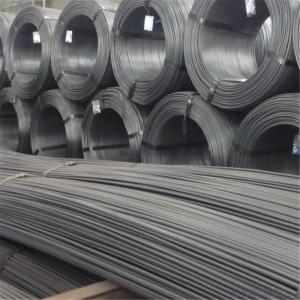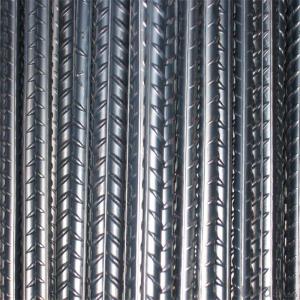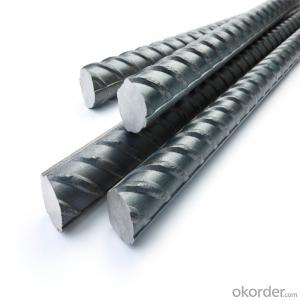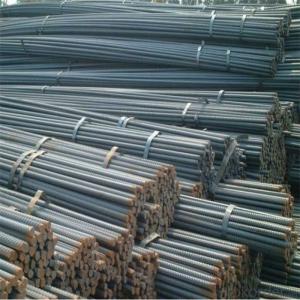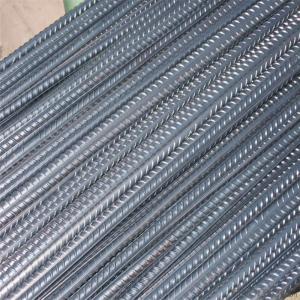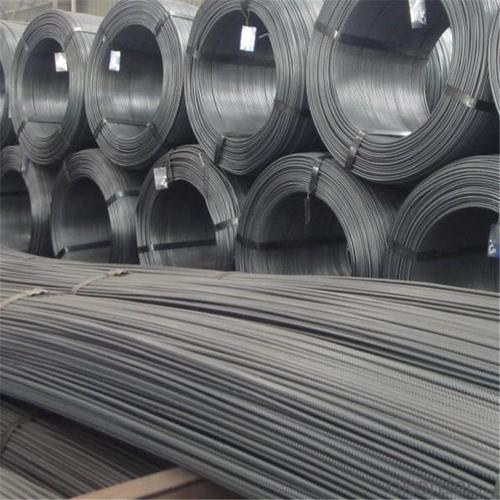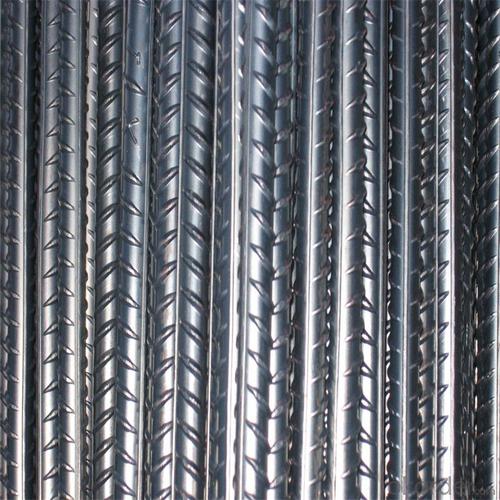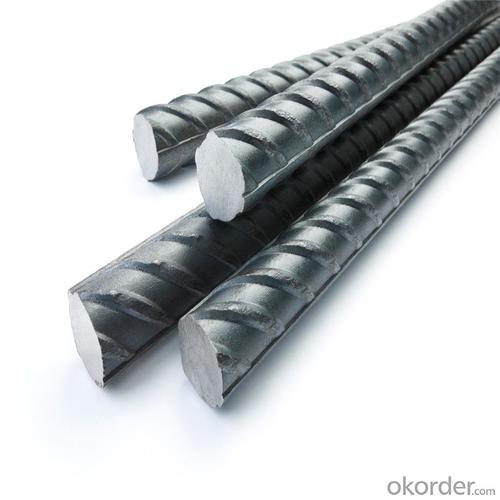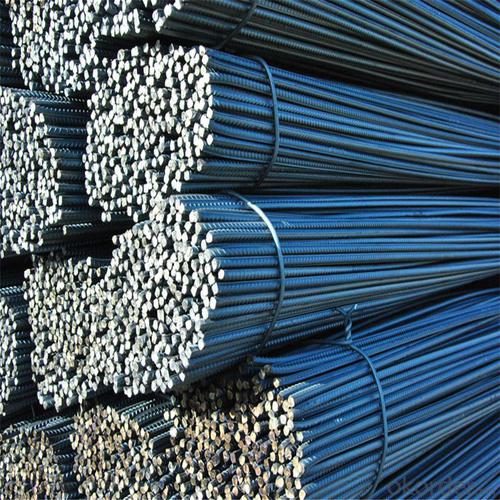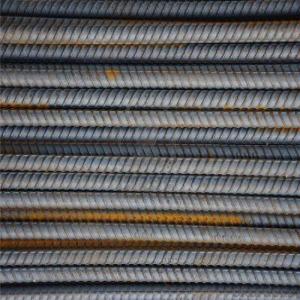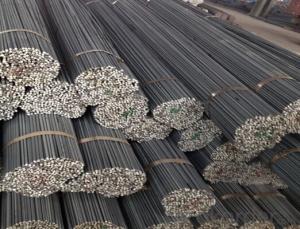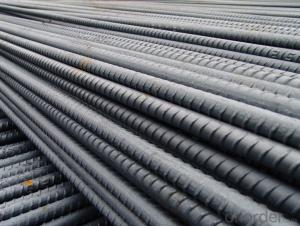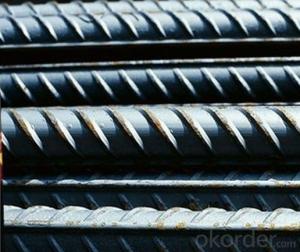ASTM Reinforcing Steel Rebar
- Loading Port:
- Tianjin
- Payment Terms:
- TT OR LC
- Min Order Qty:
- 190 m.t.
- Supply Capability:
- 500000 m.t./month
OKorder Service Pledge
OKorder Financial Service
You Might Also Like
Specification
ASTM Reinforcing Steel Rebar
Description of ASTM Reinforcing Steel Rebar
1, Diameter: 5.5mm-10mm ASTM Reinforcing Steel Rebar
10m- 40mm ASTM Reinforcing Steel Rebar
2, Length: 6m, 9m, 12m or customized
3, Standard: GB, ASTM, AISI, SAE, DIN, JIS, EN
OEM technology - send detailed technical parameters for accurate quotation.
2, Produce Process: smelt iron - EAF smelt billet - ESR smelt billet -
hot rolled or forged to get the steel round bar and plate
3, Heat Treatment: annealing, normalizing, tempering, quenching
4, Surface Treatment: Black
5, Quality Assurance: We accept third party inspection for all orders.
You can ask testing organizations such as SGS, BV, etc. to test our products before shipping.
Chemical Composition of ASTM Reinforcing Steel Rebar
Grade | Technical data of the original chemical composition(%) | |||||
Reinforcing steel bar HRB335 | C | Mn | Si | S | P | B |
≤0.25 | ≤1.60 | ≤0.80 | ≤0.045 | ≤0.045 | >0.0008 | |
Physics Capability | ||||||
Yield Strength(N/cm2) | Tensile Strength(N/cm2) | Elongation(%) | ||||
≥ 335 | ≥490 | ≥16 | ||||
Reinforcing steel bar HRB400 | C | Mn | Si | S | P | B |
≤0.25 | ≤0.16 | ≤0.80 | ≤0.045 | ≤0.045 | 0.04-0.12 | |
Physics Capability | ||||||
Yield Strength(N/cm2) | Tensile Strength(N/cm2) | Elongation(%) | ||||
≥ 400 | ≥ 570 | ≥ 14 | ||||
Products Show of ASTM Reinforcing Steel Rebar
Company Information
CNBM International Corporation is the most important trading platform of CNBM group.
Whith its advantages, CNBM International are mainly concentrate on Cement, Glass, Iron and Steel, Ceramics industries and devotes herself for supplying high qulity series of refractories as well as technical consultancies and logistics solutions.


F A Q
1, Your advantages?
professional products inquiry, products knowledge train (for agents), smooth goods delivery, excellent customer solution proposale
2, Test & Certificate?
SGS test is available, customer inspection before shipping is welcome, third party inspection is no problem
3, Factory or Trading Company?
CNBM is a trading company but we have so many protocol factories and CNBM works as a trading department of these factories. Also CNBM is the holding company of many factories.
4, Payment Terms?
30% TT as deposit and 70% before delivery.
Irrevocable L/C at sight.
5, Trading Terms?
EXW, FOB, CIF, FFR, CNF
6, After-sale Service?
CNBM provides the services and support you need for every step of our cooperation. We're the business partner you can trust.
For any problem, please kindly contact us at any your convenient time.
We'll reply you in our first priority within 24 hours.
- Q: What are the applications of special steel in the aerospace sector?
- Special steel has numerous applications in the aerospace sector due to its exceptional properties and capabilities. Firstly, special steel is used in the manufacturing of aircraft engines. The high strength and temperature resistance of special steel make it ideal for components such as turbine blades and discs, which are subjected to extreme heat and stress during operation. Special steel also offers excellent corrosion resistance, ensuring the longevity and reliability of critical engine parts. Another application of special steel in the aerospace sector is in the construction of aircraft structures. Special steel alloys are utilized to fabricate landing gear, wing components, and other structural elements. The high strength-to-weight ratio of special steel enables the production of lightweight yet robust structures, contributing to fuel efficiency and overall performance. Special steel is also employed in the production of aerospace fasteners. These include bolts, nuts, and screws that hold various aircraft components together. The exceptional mechanical properties and resistance to fatigue and vibration of special steel make it an ideal material for fasteners, ensuring the integrity and safety of aircraft assemblies. Furthermore, special steel finds application in aerospace tooling and equipment. Tools used in the manufacturing process, such as cutting tools and molds, are often made from special steel. Its high hardness and wear resistance enable efficient and precise machining of aerospace components. Additionally, special steel is utilized in the production of specialized equipment, such as test rigs, calibration devices, and ground support equipment, which are crucial for aerospace operations and maintenance. In summary, special steel plays a vital role in the aerospace sector. Its use in aircraft engines, structures, fasteners, and tooling contributes to the overall safety, performance, and reliability of aerospace systems. The unique properties of special steel make it an indispensable material for the demanding and critical applications within the aerospace industry.
- Q: Can special steel be used in the manufacturing of household appliances?
- Yes, special steel can be used in the manufacturing of household appliances. Special steel, also known as alloy steel, offers a range of desirable properties such as high strength, durability, and resistance to corrosion and wear. These characteristics make it suitable for various applications, including the production of household appliances. Household appliances such as refrigerators, ovens, dishwashers, and washing machines require materials that can withstand constant use, high temperatures, and exposure to water and chemicals. Special steel fulfills these requirements and provides a reliable and long-lasting solution. For example, stainless steel is a type of special steel commonly used in household appliances due to its corrosion resistance and hygienic properties. It is used in appliance components such as refrigerator doors, oven interiors, and dishwasher interiors. Stainless steel is easy to clean, maintains its appearance over time, and does not react with food or other substances, making it an ideal choice for household appliances. Additionally, special steel alloys can be used to enhance specific properties needed in different appliances. For instance, heat-resistant alloys can be utilized in ovens or stovetops, while high-strength steel alloys can be employed in appliances that require structural integrity, like washing machines or dryers. In summary, special steel can definitely be used in the manufacturing of household appliances. Its various properties, including strength, durability, resistance to corrosion, and versatility, make it an excellent material choice for ensuring the performance, longevity, and safety of household appliances.
- Q: How does special steel perform in cryogenic fatigue resistance?
- Special steel generally performs well in cryogenic fatigue resistance. The unique composition and heat treatment processes used in manufacturing special steel result in improved strength, toughness, and resistance to cracking at low temperatures. This makes it highly suitable for applications in cryogenic environments where materials are subjected to extreme cold temperatures and cyclic loading.
- Q: How does special steel perform under high temperatures?
- Special steel is specifically designed to perform exceptionally well under high temperatures. It exhibits excellent strength, hardness, and resistance to deformation, even when exposed to extreme heat. Additionally, special steel demonstrates remarkable resistance to oxidation and corrosion, making it highly suitable for applications that involve high temperatures, such as in the aerospace, automotive, and power generation industries.
- Q: What are the factors that affect the wear resistance of special steel?
- The factors that affect the wear resistance of special steel include the composition of the steel, the hardness of the steel, the presence of carbides or other strengthening elements, the microstructure of the steel, the presence of surface treatments or coatings, the contact load or pressure applied to the steel, the sliding speed or velocity of the contact, the temperature at which the steel is operating, and the presence of any abrasive or corrosive media.
- Q: How is special steel used in the manufacturing of machinery?
- Special steel, with its unique properties that make it highly suitable for the manufacturing of machinery, is an essential component in this process. It refers to a category of steel alloys that have been specifically designed and developed to possess exceptional strength, durability, and resistance to wear and tear. In various applications within the manufacturing of machinery, special steel is commonly used. One primary use is in producing machine components requiring high strength and toughness, such as gears, shafts, bearings, and fasteners. These components endure heavy loads, high temperatures, and harsh operating conditions, necessitating the ability to withstand these stresses without failure or deformation. Special steel provides the required strength and toughness for ensuring the longevity and reliability of these machine parts. Furthermore, special steel is utilized in manufacturing cutting tools and dies. Cutting tools, including drills, milling cutters, and lathe tools, require excellent hardness and wear resistance to endure the forces and abrasion encountered throughout the machining process. Dies, on the other hand, are used for shaping or forming materials and necessitate high strength and hardness to endure repetitive pressure and deformation. Special steel offers the necessary properties to enhance the performance and lifespan of these cutting tools and dies. Moreover, special steel frequently finds application in constructing machine frames and structural components. Its strength and rigidity make it ideal for supporting heavy loads and maintaining overall machinery stability. By incorporating special steel into machine frame construction, manufacturers can ensure the structural integrity and durability of the machinery, which is crucial for safe and efficient operation. In conclusion, special steel plays a vital role in the manufacturing of machinery by providing the necessary strength, durability, and wear resistance for critical machine components, cutting tools, and structural elements. Its unique properties make it indispensable in producing high-performance machinery capable of enduring the demanding conditions of various industries.
- Q: How does special steel perform in high-velocity impact conditions?
- Special steel is specifically engineered to excel in high-velocity impact situations, providing outstanding performance. Its composition and metallurgical properties are unique, resulting in remarkable resistance to deformation and failure under extreme forces. A key characteristic of special steel is its exceptional strength, enabling it to withstand the immense forces encountered in high-velocity impact scenarios. This strength is achieved through meticulous alloying and heat treatment processes that enhance the material's capacity to absorb and distribute energy. Consequently, special steel can effectively resist deformation and preserve its structural integrity even when subjected to severe impact loads. Moreover, special steel possesses remarkable toughness, allowing it to absorb significant amounts of energy before fracturing. This characteristic is crucial in high-velocity impact conditions where the material must endure sudden and intense forces. The high toughness of special steel permits it to absorb and dissipate the impact energy, preventing catastrophic failure and ensuring the ongoing performance of the component or structure. Additionally, special steel often exhibits superb resistance to wear and abrasion, which is advantageous in high-velocity impact scenarios involving sliding or rubbing contact. This wear resistance guarantees that the material maintains its integrity and functionality even during prolonged and repetitive impact conditions, reducing the risk of premature failure. Overall, special steel excels in high-velocity impact conditions due to its exceptional strength, superb toughness, and superior wear resistance. Its ability to withstand extreme forces and efficiently absorb impact energy makes it the preferred choice for applications where durability and reliability are of utmost importance.
- Q: How is special steel used in the marine supply chain?
- Special steel is used in the marine supply chain for various purposes. It is commonly used in the construction of ships and offshore structures due to its high strength and corrosion resistance properties. Special steel is also used in the manufacturing of marine equipment such as propellers, shafts, and valves, ensuring reliable performance and durability in harsh marine environments. Additionally, special steel plays a crucial role in the production of marine components, ensuring the safety and efficiency of the marine supply chain.
- Q: Can special steel be used in the medical industry?
- Yes, special steel can be used in the medical industry. It is commonly employed in the production of surgical instruments, medical implants, and equipment due to its high strength, corrosion resistance, and biocompatibility. Special steel alloys, such as stainless steel and titanium alloys, are extensively utilized in various medical applications to ensure patient safety and enhance the effectiveness of medical procedures.
- Q: What are the challenges in surface treating special steel?
- When it comes to surface treating special steel, a range of challenges can arise due to the unique properties and composition of the material. Some of the main challenges that need to be addressed are as follows: 1. Hardness: Special steels often possess a high level of hardness, which poses difficulties in achieving effective surface treatment. Traditional methods like heat treatment or chemical processes may not be sufficient to modify the surface properties without impacting the core strength. 2. Surface contamination: During the surface treatment process, special steels are vulnerable to contamination. Even the smallest traces of impurities or foreign materials can compromise the integrity of the treated surface. It is crucial to maintain a controlled environment and utilize clean equipment to minimize the risks of contamination. 3. Complex alloy composition: Special steels are typically alloyed with various elements to enhance specific characteristics, such as corrosion resistance or high temperature stability. This complex composition can make it challenging to find suitable surface treatment techniques that can effectively modify the surface properties without negatively affecting the overall performance of the alloy. 4. Adhesion and coating uniformity: Ensuring good adhesion and coating uniformity on special steel surfaces can be problematic. The surface characteristics and microstructure of special steels can make it challenging for coatings or treatments to properly and evenly adhere. Special attention must be paid to surface preparation and the selection of appropriate primers or coatings to ensure optimal adhesion and uniformity. 5. Heat sensitivity: Some special steels may be sensitive to heat during surface treatment processes. Excessive heat exposure can lead to changes in the material's properties, including structural alterations or deformation. It is essential to carefully control temperatures and employ suitable cooling methods to prevent any undesirable effects on the steel during the surface treatment process. 6. Cost: The process of surface treating special steel can be costly due to the specialized equipment, materials, and expertise required. Additionally, the challenges mentioned above can increase the complexity and time needed for surface treatment, resulting in higher costs. It is crucial to take these factors into consideration when planning and budgeting for surface treatment on special steel components.
Send your message to us
ASTM Reinforcing Steel Rebar
- Loading Port:
- Tianjin
- Payment Terms:
- TT OR LC
- Min Order Qty:
- 190 m.t.
- Supply Capability:
- 500000 m.t./month
OKorder Service Pledge
OKorder Financial Service
Similar products
Hot products
Hot Searches
Related keywords
